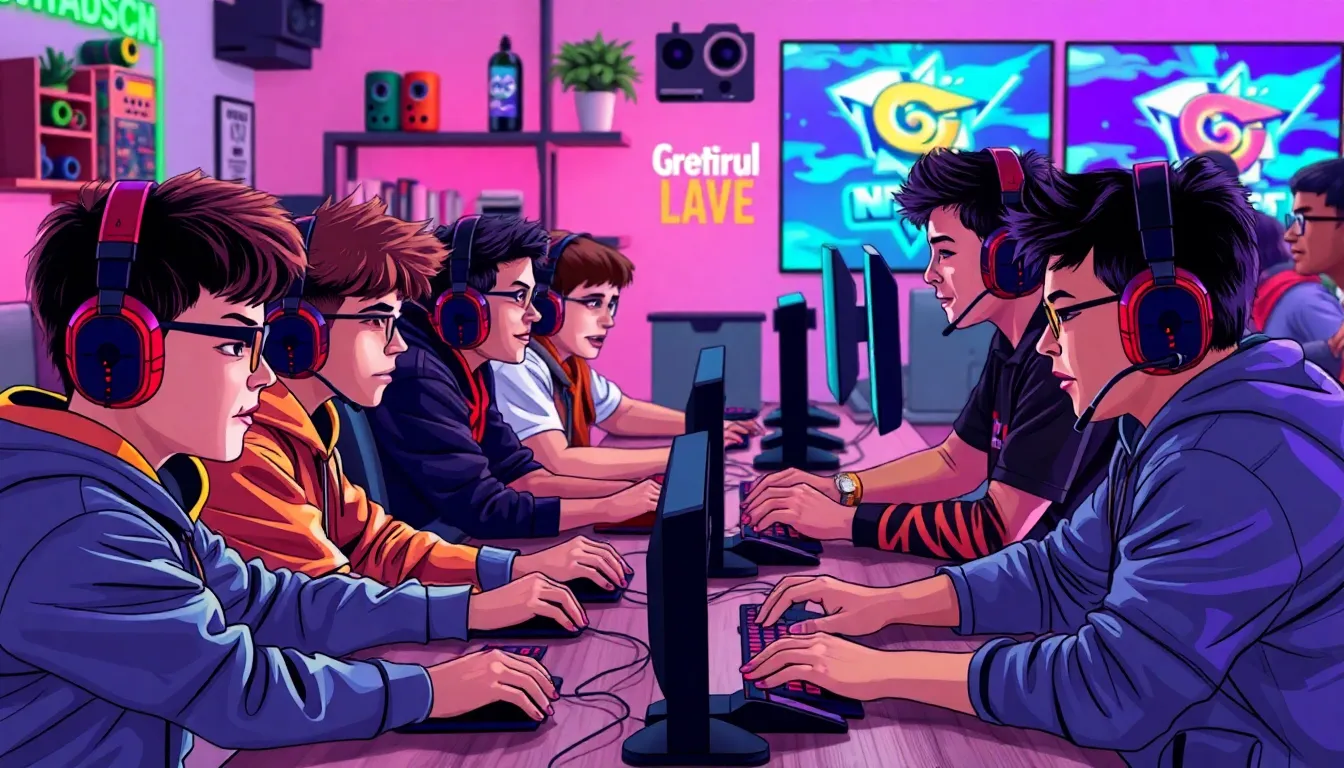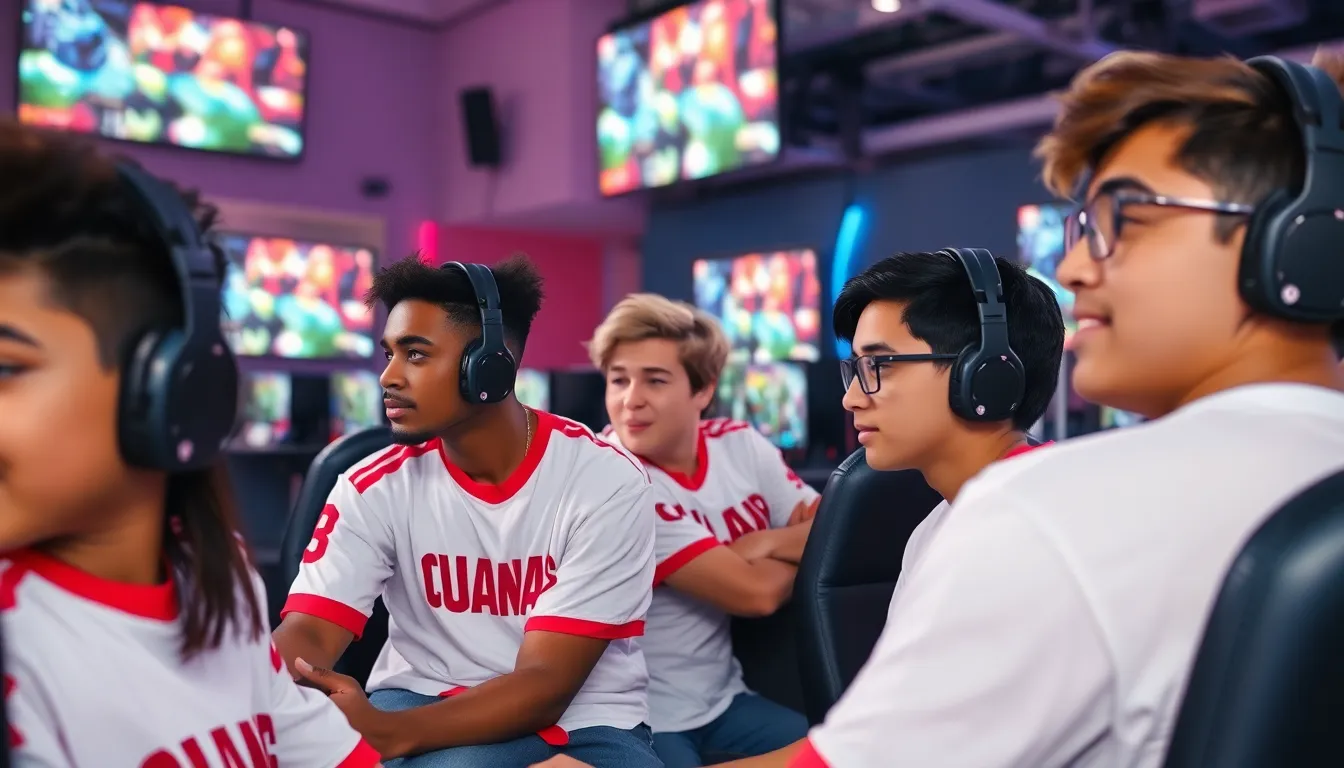In a world where gaming isn’t just a pastime but a full-blown phenomenon, youth esports leagues are taking center stage. Picture this: kids swapping playgrounds for virtual arenas, battling it out in epic showdowns while honing skills that could rival seasoned pros. It’s not just about the glory of victory; it’s about teamwork, strategy, and maybe even a little trash talk—who knew that could build character?
These leagues are more than just a digital playground; they’re shaping the future of sports. As kids dive into competitive gaming, they develop crucial life skills, from communication to critical thinking. So, whether they’re aiming for the championship or just trying to beat their buddy’s high score, youth esports leagues are paving the way for a new generation of champions. Let’s explore why these leagues are the ultimate game-changer for young gamers everywhere.
Table of Contents
ToggleOverview of Youth Esports Leagues
Youth esports leagues have emerged as vital platforms for young gamers. These leagues create structured environments where players can compete at various skill levels. Many organizations develop leagues that cater specifically to different age groups, ensuring inclusivity and accessibility. Competitive play encourages skill development in video games while promoting teamwork.
Participants build valuable life skills through regular practice and competition. Communication becomes essential when players coordinate strategies during matches. Critical thinking skills are enhanced as they analyze opponents and adapt to evolving game situations. Moreover, engagement within these leagues fosters friendships among like-minded individuals.
Participation in youth esports leagues also cultivates a sense of belonging. Players experience camaraderie while working towards common goals, further enhancing their social skills. Organizations and schools have recognized the positive impact of these leagues, leading to the integration of esports into academic settings.
Statistics reveal a growing interest in youth esports. With over 75% of boys and girls expressing interest in competitive gaming, the demand for structured leagues continues to rise. Families are increasingly supportive of esports, with many viewing it as a legitimate pursuit alongside traditional sports.
These leagues not only promote gaming skills but also emphasize personal growth and development. Core values such as sportsmanship and resilience are often highlighted in league activities. Overall, youth esports leagues represent a transformative shift in how children engage with technology and sports.
Benefits of Youth Esports Leagues

Youth esports leagues offer numerous advantages, providing vital experiences for young gamers. These structures not only enhance gaming skills but also cultivate essential life competencies.
Skill Development
Skill development stands out as a key benefit of participation in youth esports leagues. Participants engage in strategic thinking and decision-making during competitions. Players learn to analyze game situations and adapt their strategies accordingly. Technical skills improve as gamers practice regularly, mastering controls and game mechanics. Many leagues also provide coaching resources that enhance players’ understanding. Learning teamwork occurs as participants collaborate to achieve common goals. Structured practice sessions encourage consistent improvement and foster a growth mindset.
Social Interaction
Social interaction emerges as another significant benefit of youth esports leagues. Players connect with peers who share similar interests and passions. Friendships often form through teamwork, sparking camaraderie among teammates. Communication skills develop through coordinating strategies and discussing gameplay experiences. A sense of belonging strengthens as participants engage with one another in a supportive environment. Participants encounter diverse backgrounds, promoting inclusivity within gaming communities. Moreover, shared experiences during competitions foster lasting relationships that transcend the gaming environment.
Challenges Faced by Youth Esports Leagues
Youth esports leagues face significant challenges that can affect their growth and sustainability. These issues include regulatory frameworks and accessibility obstacles.
Regulation and Safety Concerns
Regulation poses a complex challenge for youth esports leagues. Various organizations, including schools and local governments, have differing standards for participation, often leading to confusion. Additionally, safety concerns arise regarding screen time and its impact on health. Leagues must navigate guidelines to ensure that gaming doesn’t compromise well-being. Moreover, data privacy issues also emerge as young gamers share personal information online, necessitating robust protective measures. Programs focused on educating players about responsible gaming practices become essential to foster a safer environment.
Accessibility Issues
Accessibility remains a primary concern for youth esports leagues. Socioeconomic factors can limit participation among young gamers from low-income families. Many players lack access to high-quality gaming equipment or reliable internet connections. Without these essential resources, some youth face barriers to entry in competitive environments. Programs aimed at providing scholarships or access to gaming facilities can help mitigate these disparities. Furthermore, varying skill levels among participants create additional challenges, making it crucial for leagues to offer inclusive opportunities that cater to diverse backgrounds.
Popular Youth Esports Leagues
Numerous leagues attract young gamers, providing structured competition and development opportunities. These leagues address different gaming interests and skill levels.
League of Legends and Fortnite
League of Legends captivates players with its strategic depth and team-based gameplay. Competitions emphasize teamwork and communication skills, essential in both the game and real life. Fortnite also garners significant popularity, especially among younger audiences. The vibrant visual style and the battle royale format encourage quick decision-making and adaptability. Over 50% of young gamers express interest in these games, demonstrating their impact on youth esports culture.
Rocket League and Overwatch
Rocket League combines soccer with rocket-powered vehicles, promoting unique teamwork experiences. Players learn to collaborate effectively while engaging in fast-paced gameplay. Overwatch has emerged as a favorite, emphasizing character selection and teamwork in a vibrant world. This game requires players to strategize and adapt to various scenarios, fostering critical thinking. Over 70% of participants in youth leagues cite these games as a primary reason for their involvement, indicating their significant role in shaping young esports enthusiasts.
Future of Youth Esports Leagues
Youth esports leagues are poised for substantial growth. Increased participation rates signal a thriving future, with over 75% of young people expressing interest in competitive gaming. Many organizations and schools are recognizing the importance of these leagues, which encourages further investment in infrastructure and resources.
Growth and Expansion
Recent trends indicate that youth esports leagues are expanding rapidly. Numerous tournaments and competitions are springing up across the country as interest grows. New games are being introduced regularly, each targeting different skill levels and player interests. Organizations are forming partnerships with schools, fostering inclusive environments for diverse participants. Sponsorships from tech companies provide funding for improved equipment and training. A rise in online platforms for streaming events boosts visibility, attracting more players and spectators alike. This collaboration among stakeholders enhances opportunities for young gamers to connect and compete.
Impact on Traditional Sports
Youth esports leagues are influencing traditional sports in distinct ways. Recognition of esports parallels that of conventional athletic programs, bridging gaps between physical and virtual competition. Many young athletes are exploring both avenues, leading to increased discussions about skill transferability. Social dynamics in gaming foster teamwork and strategy that mirror those in traditional sports. Schools are incorporating esports into their athletic programs, promoting engagement in technology and sports simultaneously. Coaches now emphasize character development skills such as resilience and sportsmanship, underscoring the evolving landscape of youth athletics. Traditional sports organizations are beginning to collaborate with esports leagues to tap into this growing youth market.
Youth esports leagues are redefining the landscape of competitive gaming for the younger generation. By fostering essential life skills and promoting inclusivity, these leagues create a supportive environment where players can thrive. The growing interest in esports among youth reflects a cultural shift that emphasizes personal development alongside competition.
As these leagues continue to expand, they not only enhance gaming experiences but also bridge the gap between traditional sports and digital competition. With ongoing support from schools and organizations, youth esports leagues are set to play a crucial role in shaping the future of sports and technology for young gamers. The journey is just beginning, and the potential is limitless.




